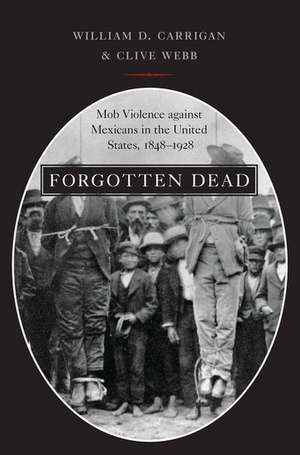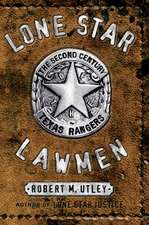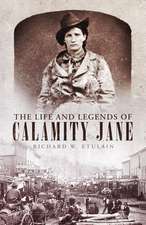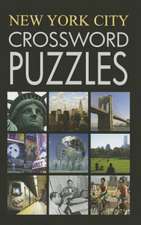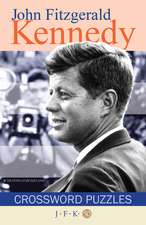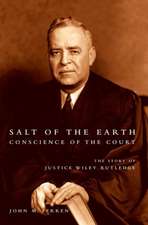Forgotten Dead: Mob Violence against Mexicans in the United States, 1848-1928
Autor William D. Carrigan, Clive Webben Limba Engleză Paperback – 9 feb 2017
| Toate formatele și edițiile | Preț | Express |
|---|---|---|
| Paperback (1) | 325.55 lei 3-5 săpt. | |
| Oxford University Press – 9 feb 2017 | 325.55 lei 3-5 săpt. | |
| Hardback (1) | 342.80 lei 31-37 zile | |
| Oxford University Press – 30 mai 2013 | 342.80 lei 31-37 zile |
Preț: 325.55 lei
Nou
Puncte Express: 488
Preț estimativ în valută:
62.30€ • 64.67$ • 51.95£
62.30€ • 64.67$ • 51.95£
Carte disponibilă
Livrare economică 01-15 martie
Preluare comenzi: 021 569.72.76
Specificații
ISBN-13: 9780190610692
ISBN-10: 0190610697
Pagini: 322
Ilustrații: 6 illus.
Dimensiuni: 231 x 155 x 23 mm
Greutate: 0.61 kg
Editura: Oxford University Press
Colecția OUP USA
Locul publicării:New York, United States
ISBN-10: 0190610697
Pagini: 322
Ilustrații: 6 illus.
Dimensiuni: 231 x 155 x 23 mm
Greutate: 0.61 kg
Editura: Oxford University Press
Colecția OUP USA
Locul publicării:New York, United States
Recenzii
Forgotten Dead packs a mighty wallop into a small package. Combining extensive research with crafeully crafted generalizations, the book reveals the origins, extent, importance, and legacy of mob violence against Mexicans.
Carrigan and Webb present a unique and pioneering set of empirical findings. ... There are few scholarly books whose most basic findings not only shake up a particular field, but also reframe a burning social issue in a way that any concerned citizen can understand. This is one such book.
This is an important book. For one, it skillfully reminds historians that mob violence occurred throughout the United States and was not just a southern problem. Carrigan and Webb's effective use of comparative analysis is a reminder that comparative history does not solely consist of comparing two nations, but can be used to great effect to compare the experience of two groups over a period of time. Carrigan and Webb also deserve commendation for their archival work and for their skillful use of nontraditional sources to discuss mob violence.
Forgotten Dead is a well-written and thoroughly researched account. ... [The] issues regarding the causes of the rise and decline of anti-Mexican mob violence are well documented and well argued.
A monumental act of recovery, Forgotten Dead returns to light the long erased Mexican victims of America's lynching violence. Showing how these racial attacks were not just standard acts of Western violence, Carrigan and Webb document the acts of murderous violence and their motivations but also how communities fought back
Forgotten Dead is one of the most important works ever published on the sad history of lynching in the United States. Carrigan and Webb's conclusions will transform how we think about and remember the history not only of lynching but also of Mexicans in the United States. They have, in short, produced a landmark book.
All of us who study American violence and race relations are indebted to Carrigan and Webb for laying out, for the first time, the contours and scope of mob violence against Mexicans and Mexican Americans. Like the better-known studies of anti-black violence, this path-breaking work will be an indispensable source for scholars and citizens alike who reckon with the legacies of this grim history.
Forgotten Dead fills a huge hole in the historiography of violence toward Mexicans in the United States. This book is more than just a document on lynching but a detailed look on the epistemology of violence toward Mexicans.
Carrigan and Webb present a unique and pioneering set of empirical findings. ... There are few scholarly books whose most basic findings not only shake up a particular field, but also reframe a burning social issue in a way that any concerned citizen can understand. This is one such book.
This is an important book. For one, it skillfully reminds historians that mob violence occurred throughout the United States and was not just a southern problem. Carrigan and Webb's effective use of comparative analysis is a reminder that comparative history does not solely consist of comparing two nations, but can be used to great effect to compare the experience of two groups over a period of time. Carrigan and Webb also deserve commendation for their archival work and for their skillful use of nontraditional sources to discuss mob violence.
Forgotten Dead is a well-written and thoroughly researched account. ... [The] issues regarding the causes of the rise and decline of anti-Mexican mob violence are well documented and well argued.
A monumental act of recovery, Forgotten Dead returns to light the long erased Mexican victims of America's lynching violence. Showing how these racial attacks were not just standard acts of Western violence, Carrigan and Webb document the acts of murderous violence and their motivations but also how communities fought back
Forgotten Dead is one of the most important works ever published on the sad history of lynching in the United States. Carrigan and Webb's conclusions will transform how we think about and remember the history not only of lynching but also of Mexicans in the United States. They have, in short, produced a landmark book.
All of us who study American violence and race relations are indebted to Carrigan and Webb for laying out, for the first time, the contours and scope of mob violence against Mexicans and Mexican Americans. Like the better-known studies of anti-black violence, this path-breaking work will be an indispensable source for scholars and citizens alike who reckon with the legacies of this grim history.
Forgotten Dead fills a huge hole in the historiography of violence toward Mexicans in the United States. This book is more than just a document on lynching but a detailed look on the epistemology of violence toward Mexicans.
Notă biografică
William D. Carrigan is Professor of History at Rowan University and the author of The Making of a Lynching Culture: Violence and Vigilantism in Central Texas, 1836-1916, the editor of Lynching Reconsidered: New Directions in the Study of Mob Violence, and the co-editor of Swift to Wrath: Lynching in Global Historical Perspective.Clive Webb is Professor of Modern American History at the University of Sussex, the author of Fight against Fear: Southern Jews and Black Civil Rights and Rabble Rousers: The American Far Right in the Civil Rights Era, and the editor of Massive Resistance: Southern Opposition of the Second Reconstruction.
